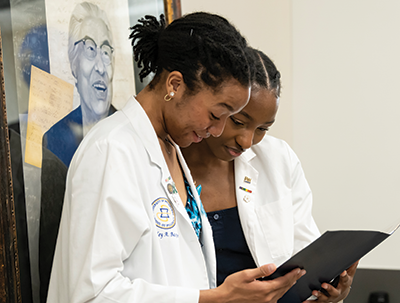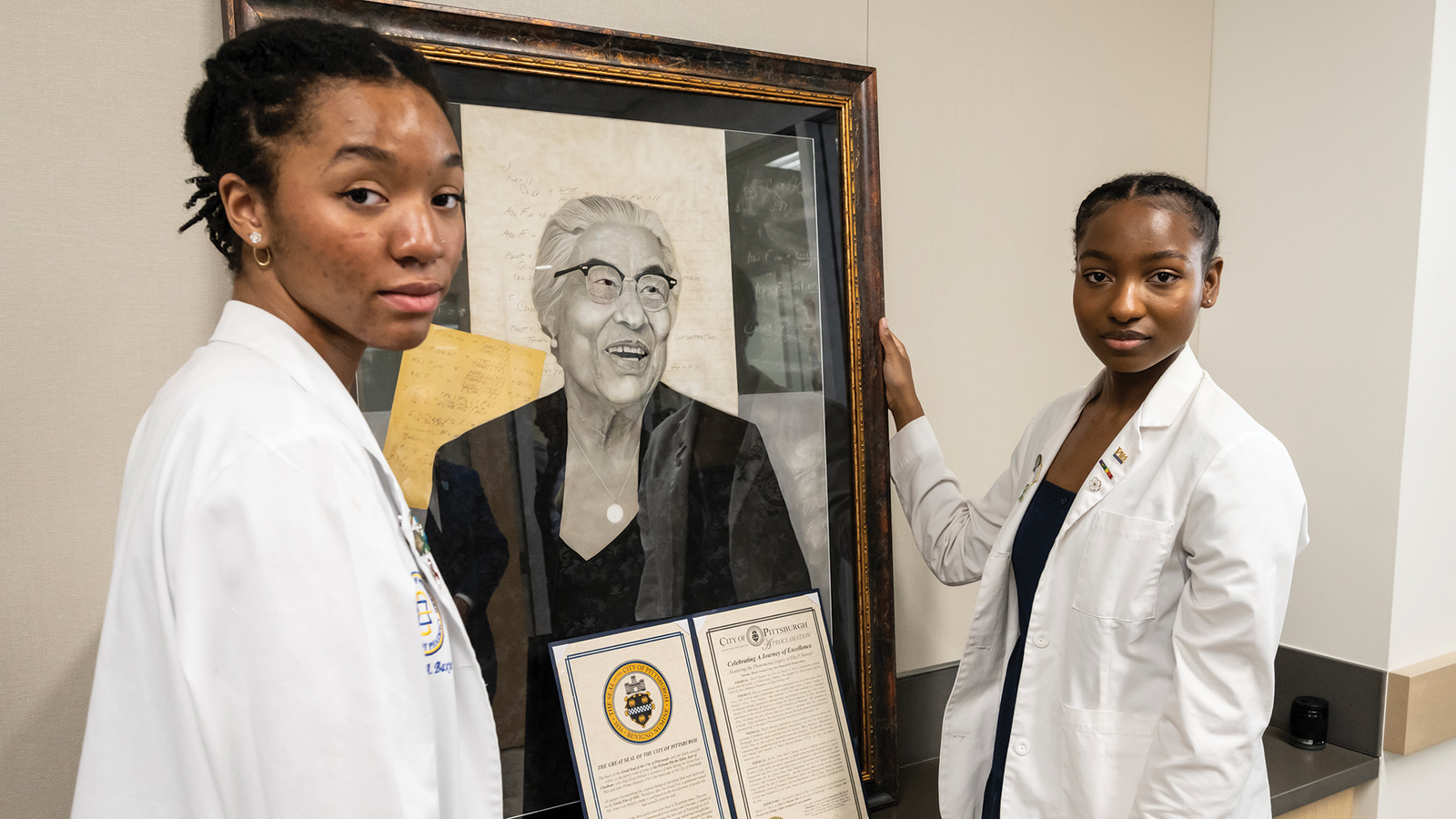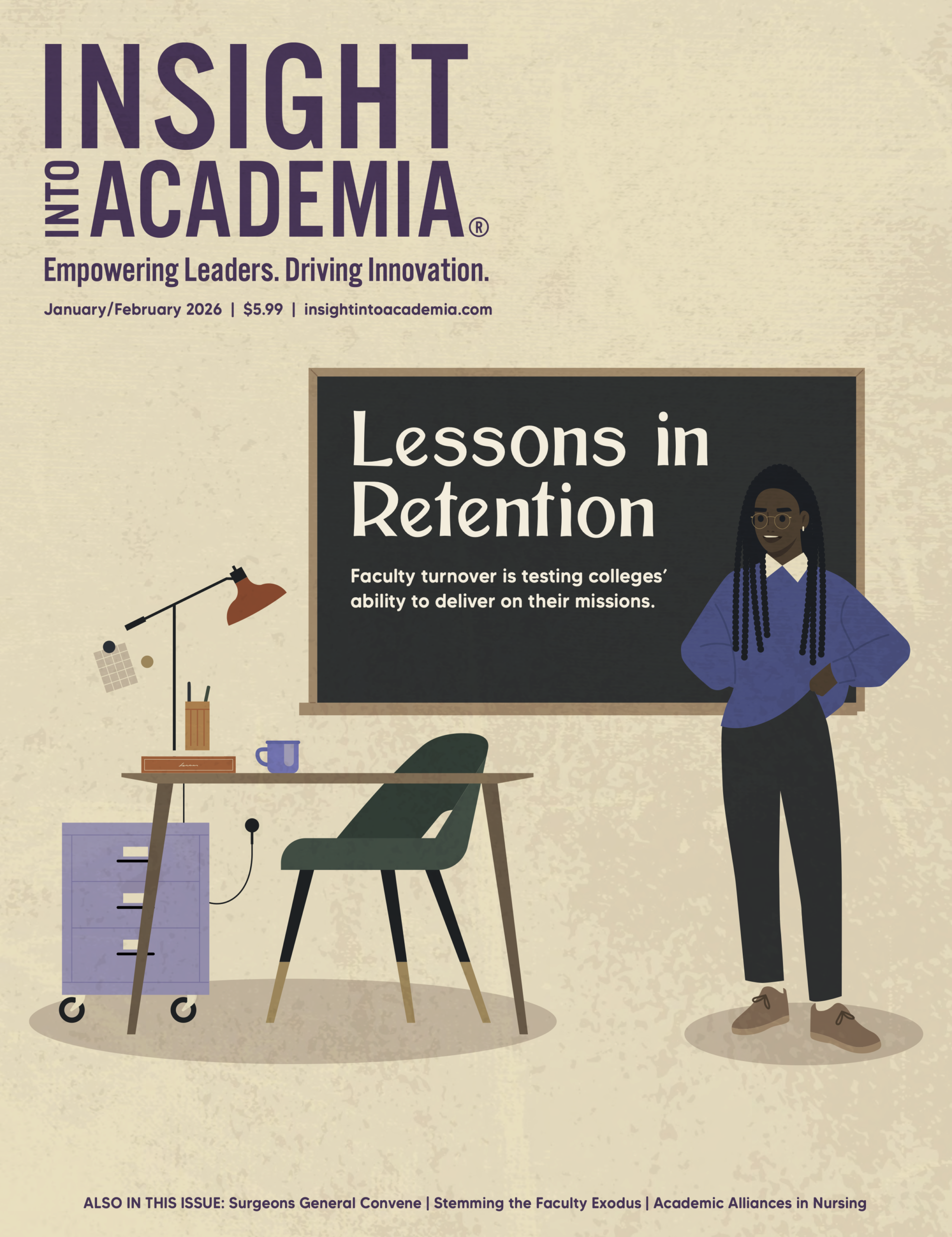In 2020, University of Pittsburgh (Pitt) School of Pharmacy doctoral students Rena Reid and Hailey Baxter experienced loneliness while going through their program.

“It was my first year of pharmacy school and I was struggling a lot mentally, just with my place in pharmacy,” Reid says. “I had previously volunteered at a vaccine clinic and all the pharmacists there were White, and I just felt so uncomfortable being in that space. And, just in general, Hailey Baxter and I are the only female Black people in our pharmacy class,” Reid says.
Reid and Baxter soon found solace in a project to honor Ella P. Stewart, a Pitt alumna and Pennsylvania’s first Black woman, as well as one of the first in the country, to practice the profession.

The project began when Reid came across a post about Stewart on Instagram. She connected with Baxter, who had just learned about Stewart the day prior from a professor. Since then, the two have been working to ensure Pitt students recognize the groundbreaking woman’s name.
Stewart’s pursuit of a pharmacy education began after her young daughter died from whooping cough. Initially rejected, she fought for her seat and in 1914, at the age of 21, Stewart was admitted to the school. Although the classroom setting was segregated, she graduated with high marks in 1916, according to the 2010 article “Ella P. Stewart: The First Black Woman to Graduate from Pitt’s Pharmacy School,” by E.R. Shipp.
Throughout her career, Stewart was a civil and women’s rights advocate. The upstairs apartment of her and her husband’s pharmacy, Stewarts’ Pharmacy in Toledo, Ohio, served as a meeting place for civic leaders and as a guesthouse for Black luminaries, Shipp reported. Among other positions, she served as president of the National Association of Colored Women’s Clubs Inc., as a goodwill ambassador for the U.S. Department of State, and on the National Advisory Committee for the White House Committee on Aging.
Stewart received the University of Pittsburgh’s Distinguished Alumni Award in 1969. The Ella P. Stewart Award, given by her estate to the Department of Biological Sciences, provides a bookstore gift certificate each year to a deserving first-year student.
“The more that we can talk about how influential Black people can be, the better health care can be for Black people and everyone in general.”
– Rena Reid
“What really stood out to me was just [how Stewart’s] classroom was segregated,” says Baxter. “On top of that, in a way, the school felt that way to me, because there was only me, Rena, and another Black student. … to get to a level where you’re in grad school and then those numbers [of students of color] just keep declining, it really does feel kind of lonely.”
In response, Baxter and Reid penned a letter to the administration, and a number of items on their list of ways to honor Stewart came to fruition, including a ceremony held on March 21 for the unveiling of a portrait of Stewart by a local artist, which incorporates Baxter’s class notes. The same day is now designated in honor of Stewart by the mayor, and a campus conference room in Salk Hall is also named for her. They also were instrumental in developing the Pitt School of Pharmacy Ella P. Stewart scholarship, which awards $3,000 annually to a student who has shown exemplary leadership skills.
These experiences demonstrate to Reid that representation is extremely important in the health care field, especially for young professionals.
“The more that we can talk about how influential Black people can be, the better health care can be for Black people and everyone in general,” she says.
Following in Stewart’s Footsteps
Baxter and Reid are graduating from the School of Pharmacy in April. They met early in their studies at Pitt and have become best friends.
Reid was born in Jamaica and her family moved to the U.S. when she was five years old. She was largely inspired by the work ethic of her mother, who also is in health care. She changed her major a few times before deciding on pharmacy.
Reid remembers feeling passionately about equitable health care when she was 12 years old and visited her grandmother in Jamaica, who later died of cancer.

Images of the many people there in need of care remain with her today. Reid’s mother, who also faced difficulty accessing quality health service, is now being treated for cervical cancer.
“I’ve always wondered, if we increased health care access and health care providers [in] those rural areas, [for] people who have little health literacy, then maybe we can actually make a difference in their prognosis,” she says. “And hopefully people would be able to regularly see a health care provider before it’s too late.”
In the future, Reid sees herself in community pharmacy. Upon graduation, she hopes to work at Giant Eagle pharmacy, where she is currently interning, and one day to manage her own store. She plans to continue volunteering at the Birmingham Free Clinic.
Baxter’s parents are also immigrants from Jamaica and they both instilled in her the value of higher education. Baxter’s mother, a certified nurse practitioner, served as an inspiration for Baxter and supported her decision to pursue pharmacy. Her clinical rotations typically allow her to connect with underserved communities. Recently, she worked in Arizona with the Tohono O’odham Nation.
Upon graduation, she plans to apply for a residency program and hopes to focus her career on palliative care and pain management.
For students of color pursuing pharmacy, Baxter says it’s important to connect with Black pharmacists on LinkedIn for advice and to not give up.
“It’s going to get tough,” she says. “You’re going to cry a lot. Things are going to be scary often. But don’t stop, because every time that you go through that feeling and every time you keep going through it, every time that you come out on top of it, you are affirming to yourself that you belong there.”●
This article was published in our January/February 2024 issue.
Above: University of Pittsburgh (Pitt) students Hailey Baxter and Rena Reid honor Ella P. Stewart, Pennsylvania’s first Black woman to practice the profession, as well as one of the first in the country. (Photo Courtesy of Aimee Obidzinski, University of Pittsburgh)

















